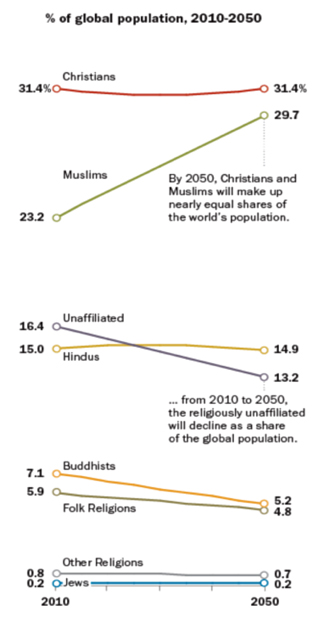December 2, 2016 | PASTOR ZACHARY PUDLO

The Current Religious Situation
From what we see in pop culture, social media, and the news it might lead us to think that the world as we know it is becoming more and more secular. However, the statistics show otherwise. I am well aware that starting out an article stating a number of current statistics is not the best way to capture the reader’s attention (the pictures and graphs will hopefully keep you interested). And if you can make it through the stats you might find some current trends in the world’s religious state of affairs surprising.

In April of 2015, Pew Research Center published an article concerning the current and future World Religion populations. Summed up: many religions will grow overall, but not all of them will grow at a rate that keeps up with the growing population of the world. Perhaps the most surprising statistic was the projection that the percentage of the world’s atheists, agnostics, and the religiously unaffiliated will slowly but steadily decline from 16.4 percent of the world’s population today to 13.2 percent forty years from now. What does that mean? The world is projected to become more religious over the next 35 years.
While Christianity will remain static in its makeup of the world’s population, there is some flux within its denominations. The membership of different denominations over the past fifty years reveals an interesting trend. If we look back 50 years we can see a clear and unequivocal trendline: liberal denominations have declined sharply while conservative denominations have increased or remained the same.
A Horizontal Problem
What is the reason for the decline in the liberal denominations? A closer look at the theology of the more liberal Christian denominations is telling. Using the United Church of Christ (UCC) as a case study provides some telling information. The UCC is one of the fastest declining Christian denominations. In 1965, the UCC had 2,070,413 members. In 2016, there were 914,871 members, a decline of nearly 56 percent in just over 50 years.
Being on the liberal end of the spectrum they fall right in line with the trend of declining liberal churches. So what is it the UCC teaches? One of their statements of faith is,
“The unity that we seek requires neither an uncritical acceptance of any point of view nor a rigid formulation of doctrine.”
To the UCC doctrine isn’t that important. On the UCC website there is a bullet point describing their synod as requiring Testimonies of faith rather than tests of faith. In other words, actions are more important the belief. Deeds are more important than creeds. The UCC encourages things that most religions encourage… regular acts of love, ministering to needs, contributing to everybody’s welfare, seeking justice and liberation. Those are all great humanitarian ideas. And what is perhaps most surprising is that these are ideas that are universal to religious people and irreligious alike. So why would the UCC and other liberal denominations which share similar sentiments on acts of love being more important than holding to traditional Christian doctrine be declining at such a rapid rate?
Is it possible they lack any real motivation to follow through with their acts of love? By their own confession “rigid doctrine” isn’t important. Ironically, the more these horizontally minded church bodies distance themselves from “rigid doctrine” the further they distance themselves from the heart of Christianity along with any real existential motivation for showing acts of kindness.
David Brooks, a New York Times Columnist, wrote this in an article in 2011,
“I was once in an AIDS-ravaged village in southern Africa. The vague humanism of the outside do-gooders didn’t do much to get people to alter their risky behavior. The blunt theological talk of the church ladies — right and wrong, salvation and damnation — seemed to have a better effect.”
Telling people to be good and loving just for the sake of being good and loving is the same as telling your 6 year old to do what you say because you say so. It may work for a short while, but it lacks any kind of long term behavioral motivation. The 6 year old may listen for a time, but everyone knows that a 16 year old won’t listen to the “because I say so” argument.
The Vertical Solution
So what are the conservative denominations doing that the liberal denominations aren’t? Conservative Lutheranism is still on the rise. Here’s a statement of faith from the WELS website that shows a clear difference from liberal mainline theology.
“‘Whoever acknowledges me before men, I will also acknowledge him before my Father in heaven’ (Matthew 10:32). With these words Jesus indicates that he wants Christians to confess publicly what they believe in their hearts.”
This is not the liberal “deeds not creeds” kind of religion. The mainline message of “Be a kind humanitarian minded person” is a message that lacks any real motivation and certainly doesn’t have the sustaining power for any long-term behavioral modification. But the core message of the Bible, the pure and simple law and gospel has been changing hearts for thousands of years. You and I will never have a change of heart to selflessness until we’ve seen the selfless sacrifice that was made for us. We will never be loving until we’ve seen the love of Christ as he laid down his life for undeserving hateful creatures like us. We will never follow through with acts of love until the truth of God’s love pierces our hearts so deeply that we can’t help but believe with our hearts and confess creeds with our mouths.
So what can we do to be certain we will continue to grow as a Church? Well, we can never be certain of that. But we can continue to do what has proven to work for thousands of years and still is working. As David Brooks wrote in his column, keep teaching the blunt truth of the Bible. Take comfort in the pure teachings of the Bible. Through them you maintain your vertical connection to God. With the vertical connection to God a natural horizontal love for others will flow from your hearts. So take comfort in the word of God. Cling to its teachings. As Paul says, “For I am not ashamed of the gospel, because it is the power of God that brings salvation to everyone who believes.” (Romans 1:16)
Chart: http://www.pewforum.org/2015/04/02/religious-projections-2010-2050/
